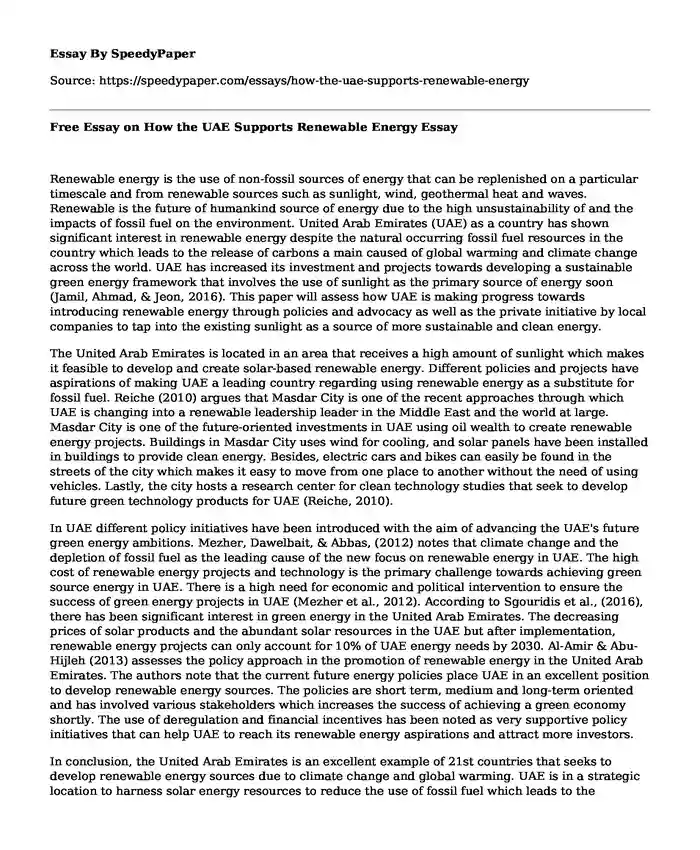Renewable energy is the use of non-fossil sources of energy that can be replenished on a particular timescale and from renewable sources such as sunlight, wind, geothermal heat and waves. Renewable is the future of humankind source of energy due to the high unsustainability of and the impacts of fossil fuel on the environment. United Arab Emirates (UAE) as a country has shown significant interest in renewable energy despite the natural occurring fossil fuel resources in the country which leads to the release of carbons a main caused of global warming and climate change across the world. UAE has increased its investment and projects towards developing a sustainable green energy framework that involves the use of sunlight as the primary source of energy soon (Jamil, Ahmad, & Jeon, 2016). This paper will assess how UAE is making progress towards introducing renewable energy through policies and advocacy as well as the private initiative by local companies to tap into the existing sunlight as a source of more sustainable and clean energy.
The United Arab Emirates is located in an area that receives a high amount of sunlight which makes it feasible to develop and create solar-based renewable energy. Different policies and projects have aspirations of making UAE a leading country regarding using renewable energy as a substitute for fossil fuel. Reiche (2010) argues that Masdar City is one of the recent approaches through which UAE is changing into a renewable leadership leader in the Middle East and the world at large. Masdar City is one of the future-oriented investments in UAE using oil wealth to create renewable energy projects. Buildings in Masdar City uses wind for cooling, and solar panels have been installed in buildings to provide clean energy. Besides, electric cars and bikes can easily be found in the streets of the city which makes it easy to move from one place to another without the need of using vehicles. Lastly, the city hosts a research center for clean technology studies that seek to develop future green technology products for UAE (Reiche, 2010).
In UAE different policy initiatives have been introduced with the aim of advancing the UAE's future green energy ambitions. Mezher, Dawelbait, & Abbas, (2012) notes that climate change and the depletion of fossil fuel as the leading cause of the new focus on renewable energy in UAE. The high cost of renewable energy projects and technology is the primary challenge towards achieving green source energy in UAE. There is a high need for economic and political intervention to ensure the success of green energy projects in UAE (Mezher et al., 2012). According to Sgouridis et al., (2016), there has been significant interest in green energy in the United Arab Emirates. The decreasing prices of solar products and the abundant solar resources in the UAE but after implementation, renewable energy projects can only account for 10% of UAE energy needs by 2030. Al-Amir & Abu-Hijleh (2013) assesses the policy approach in the promotion of renewable energy in the United Arab Emirates. The authors note that the current future energy policies place UAE in an excellent position to develop renewable energy sources. The policies are short term, medium and long-term oriented and has involved various stakeholders which increases the success of achieving a green economy shortly. The use of deregulation and financial incentives has been noted as very supportive policy initiatives that can help UAE to reach its renewable energy aspirations and attract more investors.
In conclusion, the United Arab Emirates is an excellent example of 21st countries that seeks to develop renewable energy sources due to climate change and global warming. UAE is in a strategic location to harness solar energy resources to reduce the use of fossil fuel which leads to the destruction of the environment. The government initiative through policies and financial incentives helps increase the score of the success of the local green energy projects such as Masdar City.
References
Al-Amir, J., & Abu-Hijleh, B. (2013). Strategies and policies from promoting the use of renewable energy resource in the UAE. Renewable and Sustainable Energy Reviews, 26, 660-667.
Jamil, M., Ahmad, F., & Jeon, Y. J. (2016). Renewable energy technologies adopted by the UAE: Prospects and challenges-A comprehensive overview. Renewable and Sustainable Energy Reviews, 55, 1181-1194.
Mezher, T., Dawelbait, G., & Abbas, Z. (2012). Renewable energy policy options for Abu Dhabi: Drivers and barriers. Energy policy, 42, 315-328.
Reiche, D. (2010). Renewable energy policies in the Gulf countries: A case study of the carbon-neutral "Masdar City" in Abu Dhabi. Energy Policy, 38(1), 378-382.
Sgouridis, S., Abdullah, A., Griffiths, S., Saygin, D., Wagner, N., Gielen, D., ... & McQueen, D. (2016). RE-mapping the UAE's energy transition: An economy-wide assessment of renewable energy options and their policy implications. Renewable and Sustainable Energy Reviews, 55, 1166-1180.
Cite this page
Free Essay on How the UAE Supports Renewable Energy. (2022, Oct 12). Retrieved from https://speedypaper.net/essays/how-the-uae-supports-renewable-energy
Request Removal
If you are the original author of this essay and no longer wish to have it published on the SpeedyPaper website, please click below to request its removal:
- Marketing Essay Example: The Brand Manager
- 61-69 Alpha Synuclein Essay Example
- Family System - Free Essay with a Case Study
- Essay on the Beauty of Classical Music, Free Example for Everyone
- Essay Sample Discussing the Responsibilities of a Pharmacist toward a Patient
- Free Essay: Maternity and Theology in Anne Bradstreet's Writings as Presented by Kimberly Latta
- Essay Sample on Branding Strategy in Marketing: Starbucks Backgrounder
Popular categories





